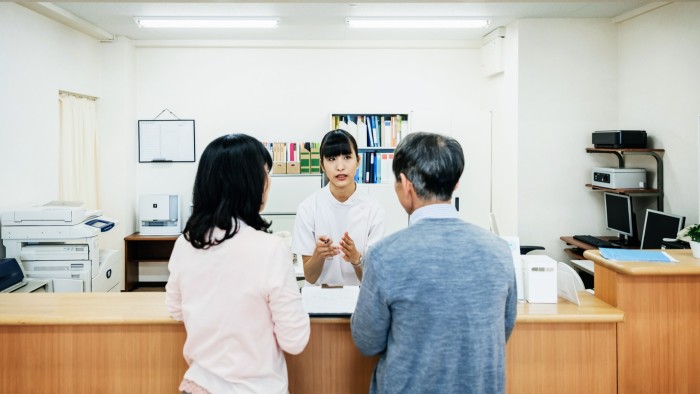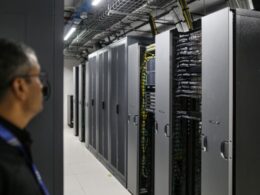Unlock the Editor’s Digest for free
Roula Khalaf, Editor of the FT, selects her favourite stories in this weekly newsletter.
Last year on a stage in central Tokyo, SoftBank’s Masayoshi Son sat down with a group of medical professionals to talk about a subject both extremely personal and technologically significant.
The billionaire founder of SoftBank had recently lost his father to cancer and was launching a joint venture with Tempus, a US medical diagnostics company, that would analyse genes and other data using artificial intelligence.
“It is important to reduce people’s sorrow, even if only a little. To that end, we use science and technology, to that end, we use the power of AI, and to that end, we use medical science,” said Son.
The SoftBank boss had been warning for years that Japan was lagging behind in its use of AI, a technology on which he has staked his reputation and that he believes will usher in a new era for humanity.
The Japanese government is also stepping up its efforts in AI and believes that the technology could offer answers to some of the country’s most urgent health questions, which include a shortage of doctors in rural areas and rising medical costs. The government has already brought in new laws and established AI schemes in hospitals.
Lawyers at some of Japan’s most prestigious law firms are advising the government, regulators and companies on what is a fast-moving sector, both legally and medically. They are being pulled into debates over how and to what extent generative AI should be used in medicine, diagnostics and research.
“In Japan, there are many, many projects, experimental projects, for using patient data for AI machine learning. Some of those projects rely on very specialised regulation, established several years ago,” points out Takashi Nakazaki, partner at law firm Anderson Mori & Tomotsune.
In the medical sector, Japan’s heavy cultural bias towards privacy means the situation is not as simple as, say, allowing AI companies to make diagnoses based on patients’ full medical histories or to analyse big genetic databases. The latter is of particular importance to big drugs companies hoping to make breakthroughs by crunching the data.
On stage with Son last year, one doctor said: “Whenever we hear about new systems, the question is always, ‘Who will input the data? How will it be gathered?’ That’s usually where progress stalls.”
Another said: “Our biggest challenge has been the mindset of Japanese institutions, which are very cautious about personal data.”
The government is making moves to act as a catalyst. According to lawyers deeply involved in the issue, Japan is actively working on regulations that would help standardise data collection and allow for more efficient sharing “pseudo” — partially anonymous — data with third parties, such as AI companies and drugs groups.
“In relation to AI and medicine, the Japanese government would like to create a good environment for generative AI applications — and in order to do so we need to set up an environment for gathering data and granting access to data,” says Takafumi Ochiai, a partner at law firm Atsumi & Sakai. He is also an adviser to the Japanese government’s cabinet secretariat and an expert member of the digital administrative and financial reform council, which directly advises the country’s prime minister on regulation.
Breakthroughs are emerging thanks to AI analysis being used in a variety of diagnostic areas, including predicting the survival outcome of cancer patients. Large health data sets are considered to be critical in those efforts.
Currently, says Ochiai, it is possible in strictly prescribed cases in Japan to use partially-anonymous data for secondary uses — rather than just for the primary care of the patient from whom the data came. But it is insufficiently widespread to be valuable to the sector.
“[Policymakers] need to expand this type of access . . . They will decide the plan for the medical sector in the next two months and we are considering advising [regulators and government] to make new medical data regulation that would include public and private databases,” says Ochiai.
“We also need to set up primary data-sharing infrastructure,” he says. “Standardisation is very important . . . and we need to set it up for primary use and for secondary use.”
Ochiai has also advised the government on a genomic data platform that would promote responsible cross-border data use and AI development while staying in line with Japan’s privacy laws.
Nakazaki says he has spent 80 per cent of his time over the past year on data protection and AI issues. The work ranges from advising drug companies on how to deal with patient data to counselling the authorities on regulation.
“The government asked me to consider the existing legal or cultural barriers, obstacles for utilising patient data for secondary use and . . . to make proposals about how to utilise patient data for secondary use under existing regulations,” he says.
The rules on how far and how fast AI can be incorporated into Japanese healthcare are still being written, but both lawyers predict the changes will ultimately be achieved.
Source link









